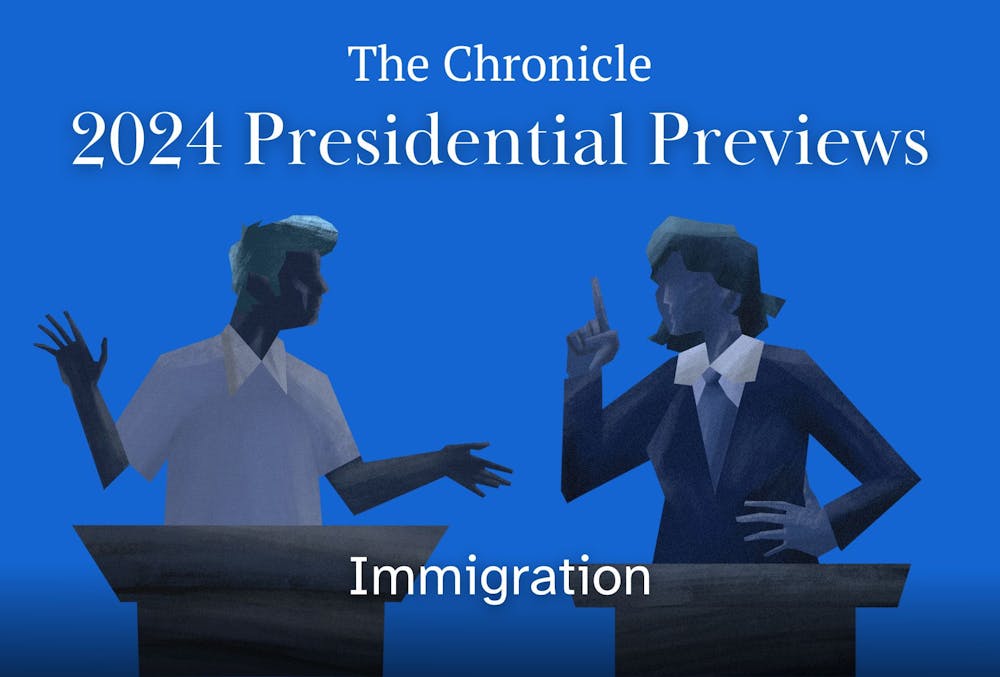Editor’s note: In advance of the 2024 presidential election, The Chronicle is breaking down each candidate’s stance on priority issues, examining their platform and political history to keep voters in the Duke and Durham community informed. In this edition, we take a look at immigration:
Immigration is set to play a key role in this year’s presidential election, as the issue has risen in recent months to the top of many Americans’ lists of policy priorities.
A February poll conducted by the Wall Street Journal found that 20% of voters considered immigration their top issue, up from 13% in December and a higher percentage than any other single issue. A June Gallup poll reported that a quarter of all registered voters would “only vote for a candidate who shares [their] views on immigration,” with another 56% considering it “one of many important factors.”
Encounters between migrants and U.S. Border Patrol officers at the U.S.-Mexico border reached a record high in 2023 with 279,741 encounters recorded in December, following a generally increasing trend since the beginning of 2021. Encounters have since fallen sharply, with 58,038 reported in August.
However, the majority of Americans are concerned about rising immigration rates. In the Gallup poll, 42% of respondents characterized the situation at the southern border as a “crisis,” and another 35% labeled it a “major problem.” Additionally, 55% of respondents said that immigration to the U.S. should be decreased, as opposed to 25% who said it should be kept at its current level and 16% who said it should be increased.
As of February, 80% of voters think the government is doing a poor job of handling the situation at the border, rating its performance either “very bad” or “somewhat bad.” That number is higher than ever before and is consistent across political parties, with 89% of Republicans and 73% of Democrats viewing the government’s response negatively.
The two major presidential candidates have staked out divergent positions on the issue, with Harris advocating for immigration reform in addition to increased border security, while Trump continues to promote heavily restrictive policies.
North Carolinian stances
In North Carolina, a March WRAL poll found that immigration is the most polarizing issue for voters. Of Trump’s supporters 54% cited it as the most important issue, compared to 18% who had then pledged to vote for Biden.
The poll also found that young voters were unlikely to list immigration as a top issue, while white voters named it their most important. It ranked in the top five of overall issues for North Carolinian voters.
According to the N.C. Department of Commerce, the state was home to roughly 832,600 foreign-born residents as of 2020, making up around 8% of the total population.
The City of Durham reports a disproportionately high rate of 14.7%, greater than the national rate of 13.5%. The city celebrated “Welcoming Week” in September in an effort to “provide individuals and communities the opportunity to proclaim and exercise their welcoming values through events and initiatives that build stronger relationships between native-born and foreign-born residents.”
Kamala Harris
As a presidential candidate, Vice President Kamala Harris has moderated her position on immigration. The issue has become a defining element of her time in office over the past three and a half years and has been a focal point for criticism from Republicans, who have labeled her the “border czar.”
While a state-level politician in California, she supported more progressive immigration policies than she has in her current role.
As attorney general in 2015, Harris directed law enforcement to assist crime victims in applying for visas. However, during her earlier tenure as district attorney for San Francisco — a sanctuary city — she faced backlash for aligning with then-Mayor Gavin Newsom on a controversial policy that required reporting undocumented juvenile immigrants to federal authorities, regardless of whether they were charged with a crime. The policy was later overturned.
After being elected to the Senate in 2016, Harris introduced a bill aimed at ensuring legal representation for individuals detained at U.S. borders. She was also the first Democrat to declare she would not support a government spending bill without protections for “Dreamers” under the Deferred Action for Childhood Arrivals (DACA) program.
During her first presidential campaign in 2019, Harris outlined several immigration policies she supported, which included using executive powers to reinstate and expand DACA, creating a pathway to citizenship for immigrants then living in the U.S., closing private detention centers and increasing oversight of U.S. Customs and Border Protection.
In 2020, the Biden-Harris ticket campaigned on a promise to roll back Trump-era immigration policies and return to a less restrictive stance more closely aligned with President Barack Obama’s.
Two months after his January 2021 inauguration, Biden recognized there was an influx of migrants illegally crossing the U.S.-Mexico border and tasked Harris with leading the U.S.’ “diplomatic effort and work with [Mexico, Honduras, Guatemala and El Salvador] to accept the returnees and enhance migration enforcement at their borders.”
Get The Chronicle straight to your inbox
Sign up for our weekly newsletter. Cancel at any time.
Harris garnered criticism from Democrats early on after she warned would-be migrants not to come to the U.S. during her first visit to Guatemala since taking on the project.
“I want to be clear to folks in this region who are thinking about making that dangerous trek to the United States-Mexico border: Do not come. Do not come,” she said in a June 2021 speech with Guatemalan President Alejandro Giammattei, later warning that “if you come to our border, you will be turned back.”
Despite this hard-line rhetoric, Harris has largely supported immigration reforms while in office.
As vice president, she backed a bipartisan border security bill that was twice-blocked by Republicans in Congress at Trump’s behest. The $118 billion package would have allocated over $20 billion to enhancing border security by overhauling current immigration law.
Its provisions included streamlining the asylum process by moving cases from the Department of Justice to the Department of Homeland Security and accelerating case reviews, increasing the number of available detention beds and giving the DHS new emergency authority to remove or block the entry of individuals if migrant encounters exceed 4,000 within a seven-day period — with mandatory action required at higher thresholds.
Harris blamed Trump for the bill’s failure in the Senate and has vowed to reintroduce and sign the bill into law if elected president.
“After decades in law enforcement, I know the importance of safety and security, especially at our border,” Harris said at the Democratic National Convention in August. “Last year, Joe and I brought together Democrats and conservative Republicans to write the strongest border bill in decades — the border patrol endorsed it. But Donald Trump believes a border deal would hurt his campaign, so he ordered his allies in Congress to kill the deal. Well, I refuse to play politics with our security.”
Harris’ 2024 immigration platform centers around “secur[ing] our borders and fix[ing] our broken immigration system.” She also advocates for “an earned pathway to citizenship.”
Donald Trump
Arguably his signature issue, Trump has campaigned heavily on restrictive immigration policies for the past three election cycles.
One of the most distinctive features of Trump’s 2016 campaign was his promise to “build a wall.” He also repeatedly referred to immigrants illegally residing in the U.S. as “illegals.”
Trump initially ran for president on a cadre of immigration-related policies, including but not limited to increasing the number of U.S. Immigration and Customs Enforcement agents threefold, mandating the use of E-Verify by businesses nationwide to verify employees' work eligibility, deporting non-citizens with criminal records, reducing federal funding to sanctuary cities, tightening legal pathways to immigration and ending birthright citizenship.
He successfully followed through on many of these policies once in office. Nonpartisan think tank the Migration Policy Institute wrote in 2022 that “over the course of four years, the Trump administration set an unprecedented pace for executive action on immigration,” enacting 472 changes that “dismantled and reconstructed many elements of the U.S. immigration system.”
In 2017, Trump signed a series of executive orders that became known as the “Muslim ban,” banning travel into the United States for people from Iran, Libya, Somalia, Sudan, Syria and Yemen. He also suspended the resettlement of refugees from Syria.
Later that year, he rescinded the Obama-era DACA policy and limited the number of admitted refugees into the nation to 45,000. He later lowered the cap to 30,000 in 2018, 18,000 in 2019 and 15,000 in 2020.
In 2018, Trump deployed troops to the southern border and threatened a government shutdown if Congress did not approve funding for a wall along the southern border. The government ultimately shut down for 35 days.
Then, in January 2019, the administration introduced the Migrant Protection Protocols, a policy requiring Mexican asylum seekers to remain in Mexico while awaiting their U.S. immigration hearings. Additionally, the administration enforced a “zero tolerance” policy, permitting authorities to deport adults who crossed the border illegally, thus separating them from their children.
In March 2020, as the COVID-19 pandemic began, the Trump administration invoked Title 42, which grants the president special authorities in order to prevent a public health emergency. He used Title 42 to quickly remove would-be immigrants and asylum seekers from the U.S., ultimately expelling around 2.8 million people.
In his current campaign for the presidency, “seal[ing] the border and stop[ping] the migrant invasion” remains the primary promise of Trump’s platform, immediately followed by “carry[ing] out the largest deportation operation in American history. If reelected, he has pledged to end the Democrats’ “open-border” policies by reverting immigration law back to what it was during his first term.
Provisions of his platform include completing the border wall and shifting significant portions of federal law enforcement agencies’ focus to immigration. Trump has promised to strengthen ICE, deploy troops to secure the southern border and block fentanyl smuggling and reinstate the "Remain in Mexico" policy. He also plans to cut federal funding to “sanctuary cities,” implement strict vetting to keep out “foreign Christian-hating Communists, Marxists and Socialists” and prioritize merit-based immigration.
Trump has also previously suggested that he would end birthright citizenship, a constitutional right.
In recent campaign appearances, he has stoked fears of “migrant crime,” though several recent studies have found that immigrants do not commit crimes at higher rates than native-born Americans.
Other candidates
Independent candidate Cornel West supports more “transformative” policies relative to the current immigration system. In his platform, he advocates for streamlining the process for citizenship and work visas, ending “morally reprehensible practices” like family separation, abolishing ICE, demilitarizing the southern border and upholding existing asylum laws.
Libertarian Party candidate Chase Oliver has called for returning to an “Ellis Island-style” of processing immigration applications. In his platform, he denounced the current system as “outdated and inefficient,” arguing that the process should take “at most, days — not months or years.”
Green Party nominee Jill Stein has called for “completely overhaul[ing] this broken and abusive immigration system.” She supports ending U.S. military interventions to reduce the “crises driving people to migrate in the first place,” abolishing ICE and establishing an Office of Citizenship, Refugees and Immigration Services under the Department of Labor, expanding the number of visas available and ensuring due process for undocumented immigrants.

Claire Cranford is a Trinity sophomore and features managing editor for the news department.

